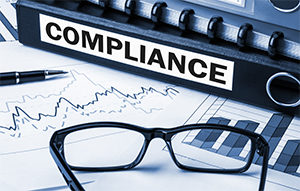Data Protection
Update: What is Regulatory Compliance?
 Regulatory compliance has many different definitions depending on what industry you are applying the policies to. Since compliance means integrating standards that follow specific requirements, regulatory compliance is the regulations a company must follow to meet specific requirements.
Regulatory compliance has many different definitions depending on what industry you are applying the policies to. Since compliance means integrating standards that follow specific requirements, regulatory compliance is the regulations a company must follow to meet specific requirements.
When you apply regulatory compliance to IT, the regulations apply to two different aspects of company operations. These include the internal requirements for IT and compliance standards. They are set forth by external entities. Both types of regulatory compliance affect IT company operations and can potentially restrict what a company can and cannot do.
Company Concerns with Regulatory Compliance
When it comes to cyber security, regulatory compliance for IT can impose added costs on company operations depending upon the industry. On the other hand, the cost of not complying with regulations both internally and externally can be significantly higher when you think of fines and time invested after a security breach.
One of the main issues with regulatory compliance is the potential for data leaks. Although there may already be policies in place, it is necessary to make sure that all employees are following them. This is an ongoing process that can lead to a high-profile data breach if companies become too lax on policy enforcement. An example of this is the Verizon breach last month which can undermine a company reputation and end up costing more in fines than it would if you followed the compliance policies. There are many benefits that come with following regulatory compliance policies which include protection of company reputation.
Issues Associated with Regulatory Compliance
To ensure the proper steps are taken to meet regulatory compliance policies. First, it is important to understand where the weaknesses are so you know exactly what practices should be applied. If you skip this step and then try to meet regulations and policies, it is likely it will cost more over the long term.
The biggest issue surrounding regulatory compliance is that many companies face multiple policies and regulations regarding cyber security and data storage, especially if personnel changes frequently. Some compliance regulations require companies to archive data for a specified period of time. If there are employee changes, it is easy to lose sight of data storage and retrieval processes.
How to Make Regulatory Compliance Work
The number one priority for making regulatory compliance work is assessment and evaluation. If you do not know where the company weaknesses are in your company then this makes it nearly impossible to put the best practices into action.
Once you know where the best practices should be applied there are many new tools that assist with simplifying the processes for regulatory compliance. These are automation tools that save time and perform the necessary requirements according to schedule. Tools for regulatory compliance are also capable of monitoring IT processes and providing reports to be used for analysis and future modifications.
If all of this is overwhelming for you, we are here to help. Thrive can ensure policies and procedures are carried out according to the requirements. We can help your company design strategies that guarantee your business will remain in compliance both within the company and with the external organizations that audit your processes. If you want to learn more about Thrive and how we can help with your compliance regulations contact us today!
